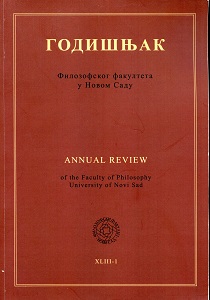BAZIČNE PSIHOLOŠKE POTREBE KOD STARIH: SOCIODEMOGAFSKI KORELATI
BASIC PSYCHOLOGICAL NEEDS OF THE ELDERLY: SOCIODEMOGRAPHIC CORRELATES
Author(s): Jelica Petrović, Ilinka JovićSubject(s): Social Sciences, Psychology, Individual Psychology, Social psychology and group interaction
Published by: Филозофски факултет, Универзитет у Новом Саду
Keywords: elderly; basic psychological needs; Self-determination theory; sociodemographic correlates; relatedness; autonomy; competence
Summary/Abstract: The main subject of this research was the examination of the relationship between the basic psychological needs of the elderly and different socio-demographic variables. The goals of the research were focused on examining relations of age, gender, level of education, family structure and marital status with the self-determination of the elderly.The survey was conducted in three cities in the Autonomous Province of Vojvodina, in retirement homes during 2014/15. The sample consisted of 219 elderlies (74.6% female). The age range was between 62 and 92 years old, and the average age of respondents was 76 years. Basic psychological needs (autonomy, competence and relatedness) were measured with the Scale of basic psychological Needs (Deci & Ryan, 2004).The obtained results of the multivariate analysis of covariates showed that the relatedness decreases with the age of the respondents, while gender differences were not registered. The results also indicate that there was a significant difference in competence among respondents of varying degrees of education. Competence is higher in those who have completed school (primary or secondary education), compared to incomplete elementary school and respondents without schooling. Differences between respondents living alone and those living with their spouse or family of their child were also examined. The results have shown that family and marital status are significantly related to the competence, so that the elderly living alone have lower results in this area compared to those who live with others.Since most of the elderly examinees in this research are widowed and live alone, we assumed that staying in retirement homes is one of the ways to compensate for the feeling of loneliness, and thus meet the need for relatedness and, therefore, competence. The need for autonomy in the examined sample was not related to socio-demographic characteristics. However, it should be emphasized that the sample in this research consisted of the elderly who actively socialize in retirement homes (i.e. those in good general health) and live outside institutions, in their own homes. It is assumed that the results could be different in the sample of the elderly who suffer from ill health, as well as in those who are accommodated in care institutions.
Journal: Годишњак Филозофског факултета у Новом Саду
- Issue Year: 43/2018
- Issue No: 1
- Page Range: 289-305
- Page Count: 17
- Language: Serbian

